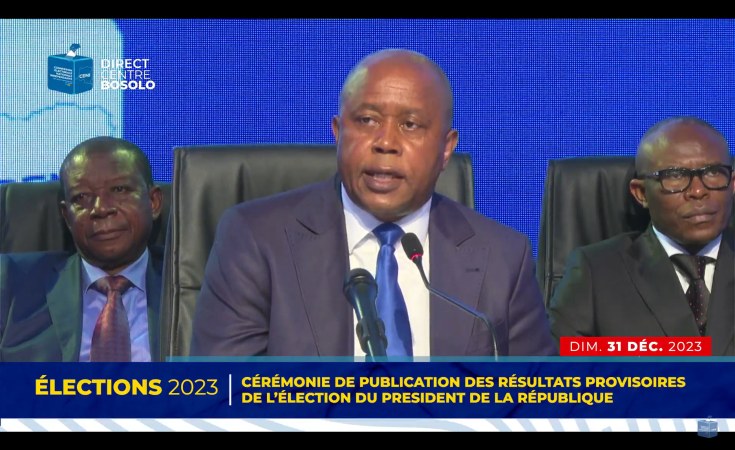The violent conflict in eastern DR Congo is dominating candidates' campaigns ahead of the December 20 elections.
The hurdles to holding free and fair elections in the vast Democratic Republic of the Congo are high. This bureaucratic act would require a long lead time, even under ideal conditions.
But the conditions for the December 20 elections are far from ideal. A land mass of more than 2.3 million square kilometers (905,355 square miles) can only be covered by plane, and the roads are often in poor condition.
Everything takes longer, from registering voters to distributing election documents and ballot boxes. Yet, in an interview with DW, DR Congo's Independent National Electoral Commission, or CENI, is optimistic ahead of the presidential, parliamentary and municipal polls.
"If God wills it, everything will be peaceful," said Didi Manara Linga, CENI's deputy chair, in a recent interview. "After all, all the presidential candidates are holding their campaigns. So far, we haven't seen any obstacle that would be so big that we couldn't hold the election."
Focus on eastern Congo
Currently, DR Congo's conflict-torn eastern provinces, especially North Kivu, have the politic's full attention.
Several presidential candidates have hit the campaign trail in eastern DRC, holding rallies in towns like Goma, Beni and Butembo. It seems the flare in the conflict that pits M23 rebels against pro-government local militias and Congolese soldiers has become the sole campaign issue.
Presidential candidate Moise Katumbi, seen as a serious contender in the elections, promises to bring peace to the east in six months.
Nobel Peace Prize winner Denis Mukwege, also running for the presidency, sees peace in the east as a top priority. "Stop the war," wrote Mukwege on X, formerly Twitter, after his appearances in Beni and Goma. "Lobi te, Lelo -- not tomorrow, but today!"
The M23 rebel group, which the UN says is supported by neighboring Rwanda, de facto controls the territories of Masisi and Rutshuru in North Kivu. Because of this, voting won't take place there.
President Felix Tshisekedi justifies excluding the approximately one million eligible voters in the territories with the need to be able to hold the elections on schedule.
Candidates' focus on North Kivu, M23 and Rwanda is "quite contradictory," political analyst Onesphore Sematumba from the International Crisis Group, a think tank, told DW.
"Two territories are excluded from the electoral process because of the insecurity and presence of the M23," Sematumba said. "But it is precisely these territories that are absent from the vote that are most present in the debate."
Everything else, such as campaign programs and policies, is being forgotten, Sematumba pointed out, decrying that Tshisekedi has ruled DRC for five years, but analysis of his presidency is lacking.
A Tshisekedi balance sheet
In fact, Tshisekedi, nicknamed Fatshi, has failed to end the raging conflict, which involves more than 120 rebel groups during his five years in office despite numerous attempts to organize external support.
Two international peacekeeping forces are withdrawing from eastern DR Congo. The 15,000-strong UN stabilization mission in the central African country, known as MONUSCO, has long lost the population's trust. It signed a withdrawal agreement at the end of November.
The mandate of the seven-nation East African Community regional force, which deployed troops to the violence-plagued region late last year, expired on December 8 on Tshisekedi's request.
Tshisekedi's five years in office don't demonstrate any other resounding successes. The political career of Tshisekedi, the son of seasoned politician and charismatic opposition figure Etienne Tshisekedi, basically began when he assumed the presidency in early 2019.
Forced into an awkward power-sharing deal with outgoing president Joseph Kabila, who ruled Congo for 18 years, it took Tshisekedi two years to distance himself from the former president and his political camp. But even in the second half of his term, Tshisekedi hasn't undertaken any significant reforms, probably due to the escalating crisis in the east and the approaching elections.
Securing power with political alliances
Meanwhile, his challengers are struggling to unite. Moise Katumbi has already united several competitors behind him, including former Prime Minister Matata Ponyo.
There are two other heavyweights: Martin Fayulu, who many believe was the real victor of the 2018 contested elections and Denis Mukwege. Whether these two could join forces to form a second opposition alliance remains to be seen.
In the 2019 elections, several prominent opposition leaders were banned from running. In contrast, the 2023 list is crowded.
"From the outset, Tshisekedi gambled on dispersing the opposition," said Sematumba. "That's why CENI admitted all candidates. The more candidates, the better."
The question of alliances is also crucial for political newcomer Tshisekedi.
"Tshisekedi doesn't know the country, and the country doesn't know him, Sematumba said. "In his five years in power, I think he's only been to the East once, before the M23 resurgence [in October]."
According to Sematumba, Tshisekedi's party, the UDPS, doesn't have roots in large parts of the country.
That is why the president has forged his own alliance with political heavyweights from different regions: Jean-Pierre Bemba, who has a strong base in the north, Vital Kamerhe and others from North Kivu and his Prime Minister Sama Lukonde from Katanga.
The election also has an element of surprise. It's a first-past-the-post ballot, which means there is no run-off between the top two candidates. As such, a slight lead could be enough to secure the presidency.
Grace Kabogo contributed to this article. It was originally written in German.


